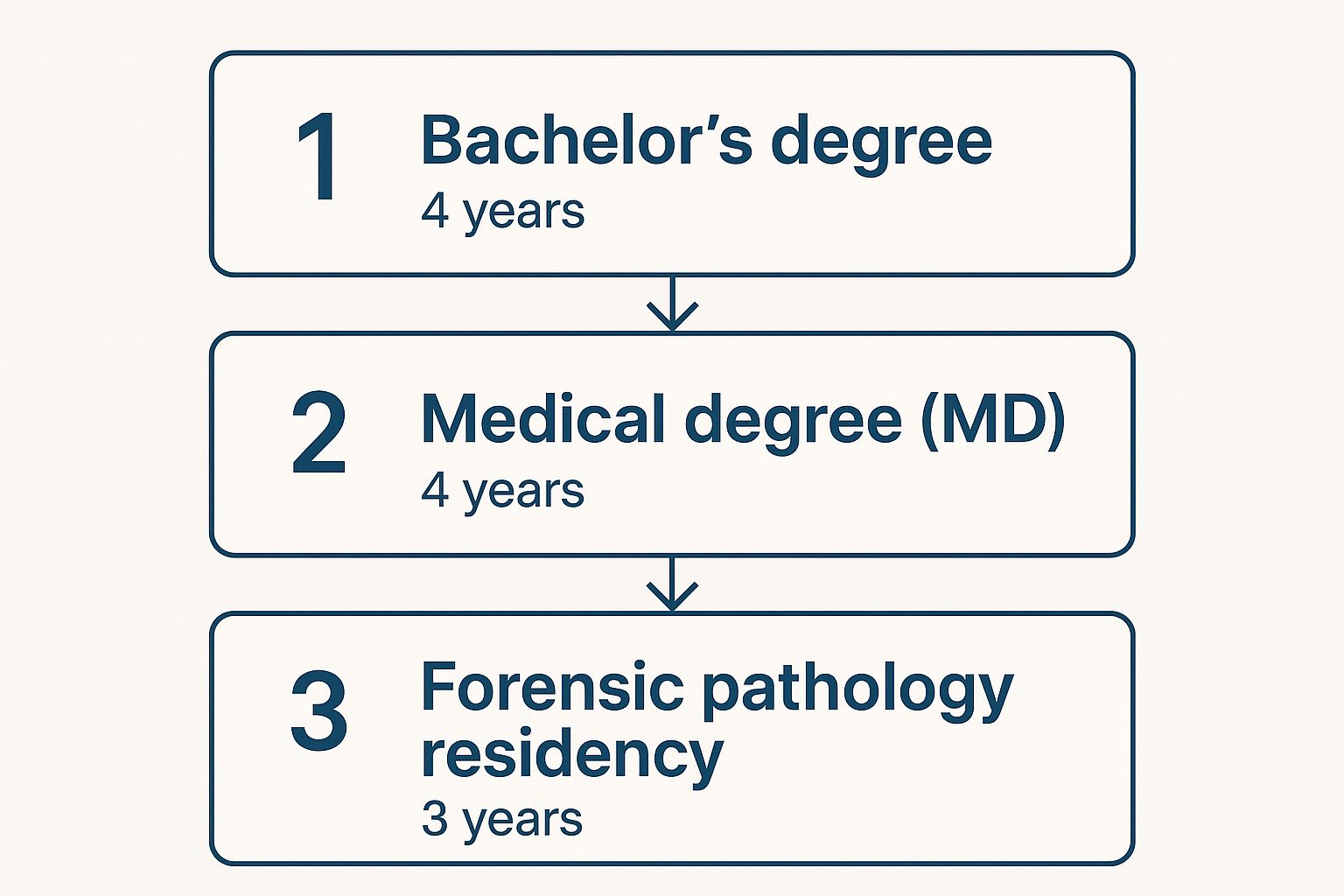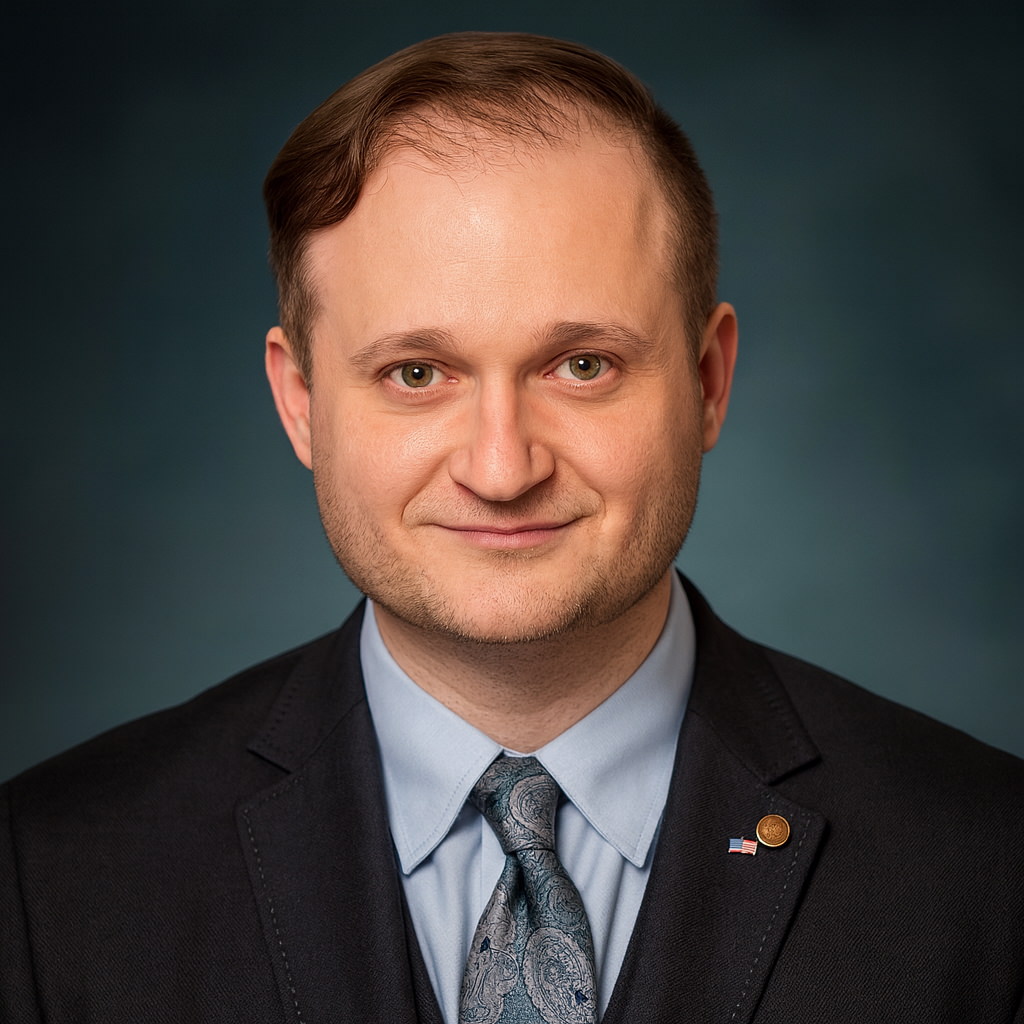TLDR: Is a Career in Forensic Pathology Right for You?
A career in forensic pathology is a unique blend of medical science and legal investigation, requiring a long-term educational commitment to determine the cause and manner of death in complex cases. It is a profession dedicated to providing answers for the deceased, their families, and the justice system.
- What They Do: Forensic pathologists are specialized physicians who perform autopsies to investigate sudden, unexpected, or violent deaths.
- Education Path: The journey requires 12-14 years of post-high school education, including a bachelor's degree, medical school (M.D. or D.O.), a pathology residency, and a forensic pathology fellowship.
- Essential Skills: Success demands a combination of strong analytical skills, medical expertise, emotional resilience, and compassionate communication.
- Job Outlook: The field faces a significant national shortage, leading to high job security but also potentially heavy caseloads.
This guide provides educational information about the career path of a forensic pathologist. The content is not medical or legal advice. All medicolegal processes should be handled by qualified professionals.
Your Guide to a Career in Forensic Pathology

Forensic pathologists are often described as "death detectives," and for good reason. They are highly specialized physicians who investigate deaths that are sudden, unexpected, or violent. Their most critical task is performing a postmortem examination, or autopsy, to determine the official cause and manner of death.
However, the role extends far beyond the autopsy suite. These experts serve as a crucial link between medicine and the law. Their findings often become pivotal evidence in legal proceedings, provide much-needed clarity to grieving families, and can help identify emerging public health crises.
A career in forensic pathology is a demanding path. It requires exceptional medical skills, a significant degree of emotional resilience, and an unwavering commitment to objective, scientific truth. This profession serves a vital public function, providing answers during times of profound uncertainty.
The Path at a Glance
The road to becoming a forensic pathologist is a marathon, not a sprint. It involves a total of 12 to 14 years of intensive education and hands-on training after high school. Each step is designed to build upon the last, forging the deep, specialized knowledge this role requires.
This rigorous pathway ensures that every board-certified forensic pathologist has the expertise to handle the immense responsibility of medicolegal death investigation with precision, integrity, and compassion.
The journey is long, but it is structured to create experts who can provide definitive answers when they are needed most. The table below breaks down the major stages of this demanding but rewarding career path.
The Path to Becoming a Forensic Pathologist
This table outlines the sequential educational and training stages required to pursue a career in forensic pathology, including typical durations for each step.
| Stage | Description | Typical Duration |
|---|---|---|
| Bachelor's Degree | A four-year undergraduate degree, typically with a focus on pre-med, biology, or chemistry, to build a strong scientific foundation. | 4 Years |
| Medical Degree | Earning a Doctor of Medicine (M.D.) or Doctor of Osteopathic Medicine (D.O.) from an accredited medical school. | 4 Years |
| Pathology Residency | Post-graduate training in anatomic and clinical pathology, where physicians learn to diagnose diseases from tissue and lab analyses. | 3–4 Years |
| Forensic Fellowship | A highly specialized training period focusing exclusively on the skills needed for medicolegal death investigation. | 1–2 Years |
This roadmap provides a clear picture of the commitment involved. While it is a challenging journey, for the right individual, the destination is a career that offers a profound sense of purpose.
What a Forensic Pathologist Actually Does
A forensic pathologist is a highly specialized physician who determines the cause and manner of death when it is sudden, unexpected, or potentially violent. The role is an intersection of medicine and investigation, where scientific principles and medical expertise are used to reconstruct the final events of a person's life.
While the autopsy is a cornerstone of their work, the responsibilities extend far beyond the examination table. A forensic pathologist acts as a crucial link between medical science and the legal system, ensuring that objective facts guide the path to justice. This requires a unique combination of clinical skill and an investigative mindset.
More Than Just an Autopsy
The work of a forensic pathologist is multifaceted. The primary objectives are to determine two key elements: the cause of death (the specific injury or disease that resulted in death) and the manner of death (the circumstances surrounding the death).
There are five recognized manners of death:
- Natural
- Accident
- Suicide
- Homicide
- Undetermined
To make this determination, a pathologist conducts a detailed examination of the body, both externally and internally. This is just one piece of a larger puzzle. They must also review the individual's medical history, understand the circumstances of their death, and analyze evidence collected from the scene. It is a methodical process where every detail matters. If you are curious about who these specialists are, you can learn more about the doctors that do autopsies in our related article.
A Day in the Life of a Forensic Pathologist
A career in forensic pathology is rarely monotonous. A typical morning might begin with reviewing new case files and communicating with law enforcement or medical examiners to understand the context of a recent death.
A significant portion of the day is often spent in the morgue performing postmortem examinations. This is focused, methodical work requiring intense concentration and precision. Every observation, regardless of how minor it may seem, is carefully documented through detailed notes, diagrams, and photographs.
A forensic pathologist’s official documentation can significantly impact legal outcomes and family understanding, which explains the extensive medical background and strict licensure requirements established for this profession.
The afternoon may involve laboratory work, such as examining tissue samples under a microscope or interpreting complex toxicology reports to determine if drugs or poisons were a factor. It might also include authoring comprehensive autopsy reports, which become permanent legal records vital for both court proceedings and for providing families with definitive information.
The Human Element of the Profession
Beyond the scientific duties, forensic pathologists perform a profoundly human service. They are often responsible for communicating their findings to grieving families. This aspect of the job requires significant compassion and the ability to discuss complex medical information in a manner that is clear, gentle, and respectful.
It is a heavy responsibility. Providing answers during a time of great pain and confusion can help families begin the process of grieving and understanding. This role highlights the deep sense of public service that motivates many in this field.
Forensic pathologists also frequently testify as expert witnesses in court. On the stand, they must explain complex medical evidence to judges and juries, presenting their objective, scientific findings in plain language. Their testimony can be a deciding factor in ensuring that legal outcomes are based on sound scientific fact.
The Long Road: Your Educational Path to Becoming a Forensic Pathologist
Becoming a forensic pathologist is a lengthy and demanding journey requiring a deep commitment to years of focused study and training. This process is not just about earning a degree; it's about systematically building the medical and investigative expertise necessary to serve this critical role.
From the beginning of undergraduate studies to the completion of fellowship training, the commitment is typically 12 to 14 years. Each stage is essential, laying the groundwork for the next.
Building Your Scientific Foundation
The path starts with a four-year bachelor's degree. Most aspiring forensic pathologists major in a science such as biology or chemistry, though a dedicated forensic science program can also be an excellent choice. This stage is where you will master the fundamental scientific principles upon which all subsequent medical training is built.
These undergraduate years are focused on achieving the academic standing and experience needed to be a strong medical school applicant. Shadowing physicians, volunteering in a hospital, or participating in a research lab can enhance an application.
Deepening Knowledge in Medical School
After obtaining a bachelor's degree, the next step is four years of medical school to earn a Doctor of Medicine (M.D.) or Doctor of Osteopathic Medicine (D.O.) degree. The first two years are primarily classroom-based, covering foundational subjects like anatomy, physiology, and pharmacology.
The final two years are dedicated to clinical rotations in various medical specialties, providing hands-on experience with patients. For an aspiring forensic pathologist, securing a rotation in a medical examiner’s or coroner’s office can offer valuable insight into the reality of the profession.

This roadmap provides a visual representation of the long and structured training process designed to create true experts in the field.
From Doctor to Specialist: Residency and Fellowship
After graduating from medical school, the training becomes highly specialized. The first major step is a three- to four-year residency in anatomic and clinical pathology. This is where physicians develop the core skills of pathology: diagnosing disease by examining tissues, cells, and body fluids.
The final piece of the educational puzzle is a one- to two-year fellowship dedicated exclusively to forensic pathology. This is where a pathologist becomes a medicolegal death investigator.
During the fellowship, trainees receive intensive, hands-on experience in performing autopsies, interpreting complex toxicology reports, analyzing injury patterns, and—crucially—testifying as an expert witness in court. It is the capstone experience that transforms a pathologist into a forensic specialist.
Upon successful completion of the fellowship, a physician is eligible to take the board certification exam from the American Board of Pathology. Passing this exam signifies the highest level of professional expertise in the field.
The Essential Skills for Success in This Field

While the extensive educational path builds a solid foundation of technical knowledge, what truly distinguishes a successful forensic pathologist is a specific blend of hard and soft skills. Medical expertise is only part of the equation. This role demands a unique mix of analytical rigor, emotional fortitude, and genuine human compassion.
A career in forensic pathology is built on an unwavering commitment to detail. A minor oversight during an autopsy or an imprecise word in a report can alter the course of a legal case or leave a grieving family without clear answers. Meticulous attention to detail is not a preference; it is a fundamental requirement.
This trait works in tandem with strong analytical and problem-solving abilities. A forensic pathologist must constantly interpret complex medical data, connect seemingly unrelated evidence, and construct a logical narrative that explains how and why an individual died.
Core Technical and Analytical Abilities
Success in the morgue and on the witness stand is founded on a specific set of technical skills honed over years of training. These are the tools that allow a pathologist to translate physical evidence into clear, objective, and defensible conclusions.
- Medical and Scientific Acumen: This is the bedrock. A deep, comprehensive understanding of anatomy, physiology, toxicology, and disease processes is absolutely essential.
- Keen Observational Skills: The role requires noticing what others might miss—subtle tissue changes, faint injury patterns, or microscopic trace evidence that could be critical to a case.
- Logical Reasoning: Evidence must be evaluated systematically, hypotheses formed, and conclusions drawn based strictly on scientific fact. There is no room for speculation.
These hard skills drive a medicolegal death investigation forward, ensuring the outcome is verifiable and fact-based.
The Human Element: Compassion and Resilience
Beyond the sterile environment of the laboratory, the most effective forensic pathologists also possess a profound set of interpersonal skills. Emotional resilience is crucial for navigating human tragedy on a daily basis without succumbing to burnout or compassion fatigue.
A forensic pathologist must maintain professional objectivity while simultaneously acknowledging the profound grief experienced by the families they serve. This delicate balance requires immense emotional intelligence and maturity.
Equally vital are empathy and communication. A significant part of the job involves explaining complex medical findings to non-medical individuals—juries, attorneys, and grieving family members—with clarity, confidence, and kindness. This includes being a credible and compelling expert witness, a role demanding exceptional public speaking and teaching abilities.
Beyond the demanding education, certain inherent traits are key to thriving in this environment. You can explore some of the essential personality traits for the medical field to gain a broader perspective. Ultimately, this career is a unique calling for those who can seamlessly blend scientific precision with a deep sense of humanity.
Understanding the Job Outlook and Salary
The career landscape for a forensic pathologist is characterized by a classic case of high demand and critically low supply. For a qualified professional, this creates significant job security, but it also highlights a field under considerable strain.
The United States is facing a serious national shortage of forensic pathologists. This is a long-standing issue that has become more acute as a generation of experienced pathologists approaches retirement while caseloads continue to climb. This imbalance means that positions are widely available in various settings, from urban medical examiner's offices to state agencies. However, it also means the workload can be intense—a crucial factor for anyone considering this career path.
The Critical Shortage of Forensic Pathologists
This shortage has profound, real-world consequences. When there are not enough forensic pathologists, families may wait longer for answers about their loved ones, and criminal investigations can be delayed, creating a bottleneck in the justice system.
The numbers illustrate the issue clearly. According to the National Association of Medical Examiners, there are only about 750 full-time, board-certified forensic pathologists practicing in the United States. To adequately handle the current national caseload, experts estimate a need for at least 1,500. With only about 40 new specialists earning board certification each year, the gap continues to widen. You can get a deeper look into this issue by exploring how to fortify the forensic pathologist workforce on ForensicMag.com.
Deconstructing the Salary Expectations
Given the extensive training, specialized skills, and immense responsibility of the job, compensation in forensic pathology is competitive. While exact figures vary based on several factors, salaries are generally strong, even within the broader medical community.
Key factors that influence a forensic pathologist's earnings include:
- Geographic Location: Salaries in major metropolitan areas or regions with a high cost of living are typically higher. Locations with the most severe shortages may also offer increased compensation to attract qualified candidates.
- Type of Employer: A government-run medical examiner's office will have a different pay structure than an academic institution or a private consulting firm.
- Years of Experience: As in any profession, experience is valued. A pathologist just completing their fellowship will be on a different pay scale than a Chief Medical Examiner with decades of experience.
While salary is a consideration, most who find fulfillment in this career are driven by a profound sense of public duty. The compensation reflects the profession's value, but the work itself offers a unique reward that extends beyond financial gain.
A Look at the Financial Realities
The Bureau of Labor Statistics (BLS) does not maintain a specific category for forensic pathologists, which can make it difficult to pinpoint an exact average salary. However, it provides comprehensive data on physicians and surgeons, and forensic pathology is a highly respected specialty within that group.
The salary should be viewed not just as an annual figure but as fair compensation for over a decade of demanding education and the high-stakes intellectual and emotional weight of the job. For anyone considering the field today, the financial outlook is very stable, reinforced by the undeniable fact that this expertise is essential and in short supply.
A Day in the Life of a Forensic Pathologist
What does a forensic pathologist actually do on a daily basis? The reality is less about high-speed drama and much more about quiet, methodical, and deeply focused scientific work.

Many days begin not in a morgue but in an office. The first order of business is reviewing new cases and checking the status of ongoing ones. This involves reading police reports, witness statements, and the deceased’s medical records.
This preliminary work is critical. Before an examination begins, it is important to build a complete picture of the circumstances. This often involves communication with law enforcement, coroners, and other investigators to ensure all parties are aligned.
The Core Scientific Work
The central component of the job—the part most people associate with the profession—is performing the autopsy. During this time, the focus shifts entirely to the morgue. It is a meticulous, step-by-step process where every observation is critical and must be documented with absolute precision.
A pathologist systematically examines the body, noting every injury, looking for subtle signs of disease, and carefully collecting tissue and fluid samples for later analysis. This requires immense concentration and strict adherence to protocol. This careful, methodical work forms the foundation of the entire investigation. To understand the specific situations that necessitate this procedure, our guide on when an autopsy is required provides additional clarity.
After the physical examination, the next phase unfolds in the laboratory. Here, the collected samples begin to provide more information. This work typically includes:
- Microscopic Examination: Examining tissue samples under a high-powered microscope to reveal cellular changes or disease processes not visible to the naked eye.
- Toxicology Review: Analyzing laboratory reports to determine if drugs, alcohol, or other substances were present in the body and what role they may have played in the death.
- Evidence Integration: Synthesizing laboratory results with the physical autopsy findings to build a logical, evidence-based conclusion.
It is in the laboratory that the various pieces of the puzzle often come together, connecting physical observations with hard scientific data.
From Findings to Formal Record
The final portion of the day is often dedicated to communication. All of the complex findings must be translated into a clear, comprehensive autopsy report. This is not merely a summary; it is a formal legal document that must be objective, detailed, and able to withstand intense scrutiny in a courtroom.
The responsibility of a forensic pathologist is immense, as their final report can provide closure for a family, identify a public health threat, or become the cornerstone of a criminal prosecution.
Of course, no two days are exactly alike. One afternoon might involve a visit to a death scene to gain firsthand context. Another could be spent entirely in the office preparing for court testimony, which involves reviewing case files and determining the clearest way to explain complex medical concepts to a jury. It is a demanding rhythm, but every task serves the same ultimate purpose: to find answers grounded in science.
Your Path Forward in Forensic Pathology
https://www.youtube.com/embed/PG_5v_dbpqY
Deciding on a career in forensic pathology is not just a professional choice; it is a profound commitment to science, public health, and the pursuit of truth.
It is a demanding path, paved with years of intense training and built on a foundation of unwavering ethical standards. It requires a rare blend of scientific objectivity and deep human compassion. As we have covered, the work is incredibly challenging, and the weight of responsibility is immense, but the impact you can make is undeniable.
Making an Informed Decision
This career offers a unique opportunity to serve others in a deeply meaningful way. Forensic pathologists provide the crucial answers that help families find a measure of closure and ensure the integrity of our legal system. It is an incredibly rewarding profession for those with the dedication and resilience to see it through.
The decision to enter this field should be made with a clear understanding of its demands. It requires an individual who can navigate tragic circumstances with professional grace while remaining meticulously focused on scientific fact.
As you weigh your options, understanding how to choose a medical specialty can provide valuable perspective. Seeing where forensic pathology fits within the larger medical landscape is a critical step in ensuring it is the right path for you.
Ultimately, this career is a calling for those driven by a need to find answers and speak for those who no longer can. It is a promise to fuse intellectual rigor with a profound sense of duty, serving both the living and the deceased with integrity.
Answering Your Questions About Forensic Pathology
Considering a career in forensic pathology naturally brings up many questions about the realities of the job. Let's address some of the most common ones.
Medical Examiner vs. Coroner: What’s the Difference?
This is one of the most common points of confusion for those outside the field. While the terms are sometimes used interchangeably, their roles and qualifications are fundamentally different.
The key distinction is medical training.
- A medical examiner is a medical doctor—specifically, a board-certified forensic pathologist. They are physicians who apply their extensive medical knowledge to investigate the cause and manner of death.
- A coroner, on the other hand, is typically an elected or appointed official. Depending on the jurisdiction, a coroner may not have any medical background.
In short, all medical examiners are physicians, but not all coroners are. Medical examiners are appointed specifically for their scientific expertise in death investigation.
How Do You Handle the Emotional Stress?
This is a valid and important question. Working closely with death and supporting grieving families is emotionally demanding.
Forensic pathologists develop strong coping mechanisms over time. This is not about being emotionless but about cultivating a professional resilience that allows one to perform the job effectively without becoming overwhelmed.
This resilience often comes from a combination of a strong sense of purpose, professional detachment, peer support from colleagues who understand the work, and prioritizing personal well-being outside of the job.
Acknowledging the emotional weight of the role is the first step. Building a sustainable career in this field means actively managing its inherent stresses.
Are There Career Options Outside of Government Work?
Absolutely. While many forensic pathologists work for government agencies—such as county, state, or federal medical examiner's offices—that is not the only option.
Some find roles in academia, teaching at universities while also conducting research and handling some clinical cases. Others may work within large hospital pathology departments or as private consultants, offering their expertise to legal teams. The highly specialized skills of a forensic pathologist are in demand across several sectors.
If you have questions about the role of a forensic pathologist, private autopsy services, or other forensic matters, our team is here to provide clear, professional, and empathetic guidance. We encourage you to contact us directly by phone or email for a confidential conversation.

